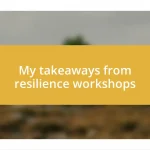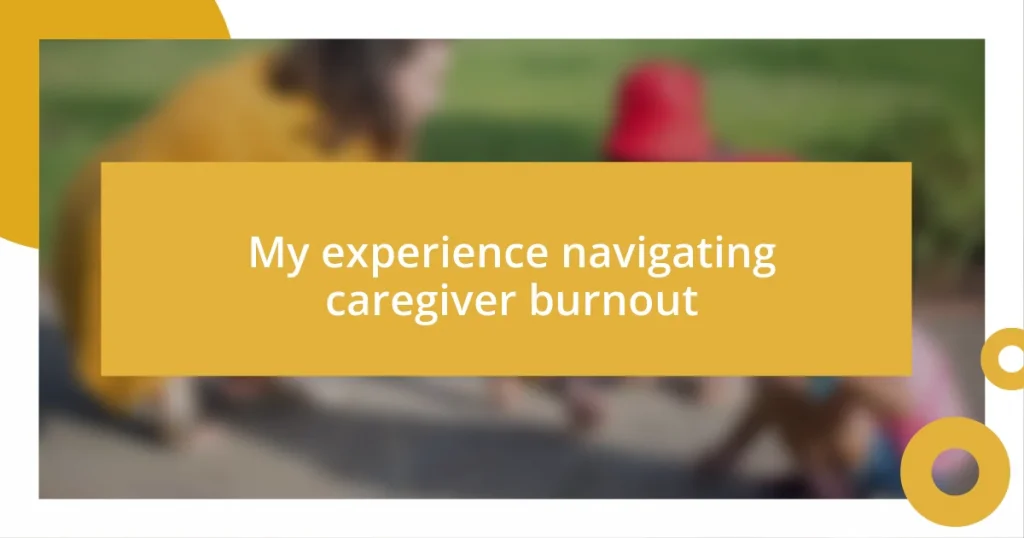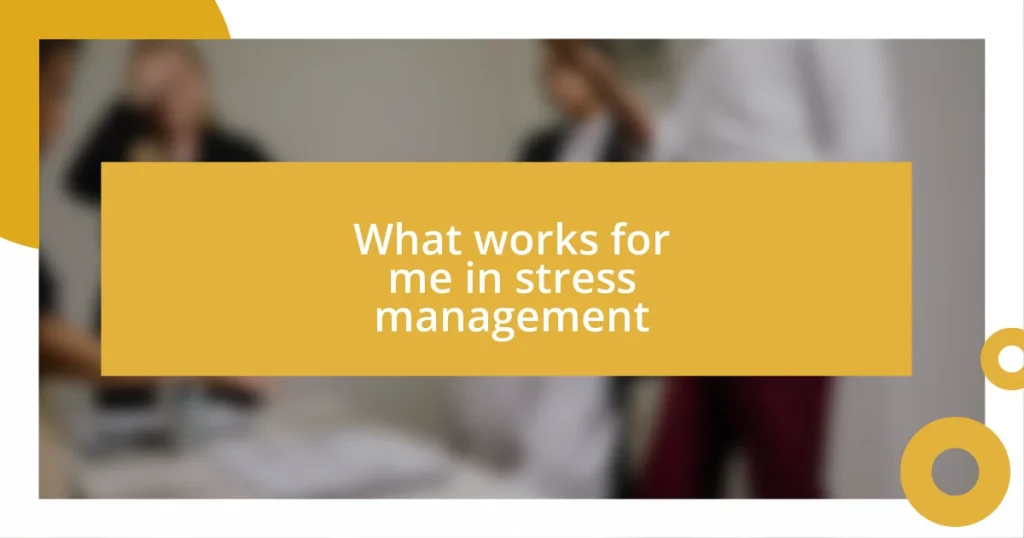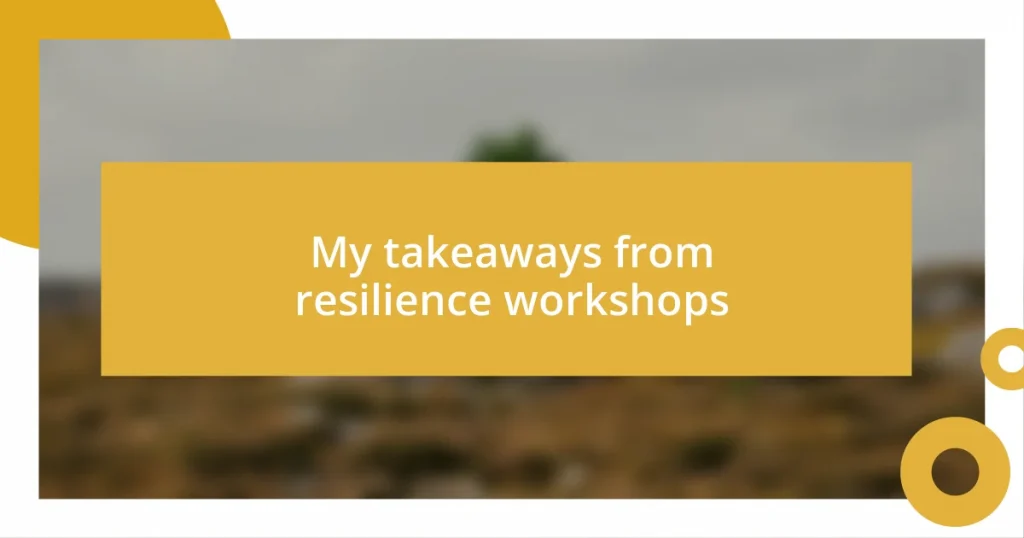Key takeaways:
- Caregiver burnout is characterized by emotional exhaustion, increased irritability, and social withdrawal, often resulting from overwhelming responsibilities and lack of support.
- Recognizing the signs of burnout and implementing self-care strategies, such as setting boundaries and seeking support, are essential steps in managing and preventing burnout.
- Rebuilding oneself after burnout involves rediscovering personal passions, celebrating small victories, and establishing limits to prioritize one’s well-being.

Understanding caregiver burnout
Caregiver burnout is a complex and deeply personal experience that often sneaks up on you. I remember a time when I felt constant exhaustion, not just physically but emotionally too. It raises the question: how do we recognize when our compassionate care for others crosses into territory that depletes our own well-being?
At its core, caregiver burnout manifests as a sense of overwhelm, hopelessness, and detachment from the very individuals we are striving to support. I vividly recall evenings when I’d sit in silence after a long day, grappling with an unsettling feeling of guilt. Why did I feel burdened when all I wanted to do was help? These emotions can create a cycle that’s difficult to break, leaving caregivers feeling isolated and unsure.
Understanding this phenomenon requires us to acknowledge our limits. I found that being honest with myself about my emotional state was both liberating and necessary. When was the last time you checked in with your own mental health? Recognizing that we must care for ourselves as fervently as we care for others is a vital step in preventing the toll that caregiver burnout can impose.

Signs of caregiver burnout
Recognizing the signs of caregiver burnout can be quite challenging, especially since they often creep in unnoticed. From my own experiences, I remember feeling increasingly irritable and impatient with the loved ones I was caring for, which was a stark contrast to my usual, compassionate demeanor. This emotional shift can be one of the first signs that something is off, typically manifesting alongside feelings of sadness or anxiety.
Another indicator I faced was a pervasive sense of exhaustion that went beyond physical tiredness. I often found myself dreading the tasks that once brought me joy, like preparing a favorite meal or sharing a laugh. This detachment can be disheartening—it’s as if the light goes dim in areas of your life that were once bright and meaningful.
As I navigated these feelings, I often found myself withdrawing from social interactions that I previously cherished. Friends would invite me out, but I’d always find an excuse not to go. This isolation only intensified my feelings of burnout, as I missed the genuine connections that provided support. It’s crucial to recognize these signs early on and address them before they spiral into a deeper emotional crisis.
| Signs of Caregiver Burnout | Description |
|---|---|
| Emotional Exhaustion | Feeling drained and unable to cope with daily tasks. |
| Increased Irritability | Experiencing heightened levels of frustration and annoyance. |
| Withdrawal from Social Interactions | Irrationally avoiding friends or family, leading to isolation. |

Causes of caregiver burnout
The causes of caregiver burnout can feel overwhelming and varied, often sneaking up on you when you least expect it. I remember moments when I was juggling multiple responsibilities—work, family, and caregiving—and the weight of it all began to crush me. It’s astonishing how the constant strain of caregiving can lead to emotional depletion, just as much as physical fatigue.
Here are some key factors that contribute to caregiver burnout:
- Unrealistic Expectations: I often found myself setting incredibly high standards for my caregiving, leading to disappointment and frustration when I fell short.
- Lack of Support: There were times when I felt like I was navigating this path entirely alone, with no one to share the burden or offer encouragement.
- Financial Strain: I vividly recall checking bills and feeling the weight of financial pressures—worrying about expenses added another layer of stress to my daily routine.
- Limited Time for Self-Care: I often put my own needs on the back burner, squeezing self-care into the smallest of windows, which ultimately diminished my well-being.
- High Emotional Labor: Intense caring requires emotional energy, and I didn’t always know how to replenish what I was giving out.
These factors combined create a perfect storm that can spiral into a deep sense of helplessness, making it crucial to pay attention to our own emotional health as caregivers. Each day, I learned that acknowledging these challenges was the first step toward avoiding the burnout that seemed ever-present in my life.

Strategies to manage burnout
To effectively manage caregiver burnout, I found that setting realistic boundaries was essential. I used to think I could do it all—work full time, care for my loved one, and maintain a social life. But I soon realized that saying “no” to certain commitments actually opened space for the self-care I desperately needed. Have you ever felt that relief when you finally let go of something unnecessary? It’s like a weight being lifted off your shoulders.
Incorporating small, regular breaks into my routine was another game changer. Even just taking ten minutes to step outside for fresh air or practicing deep breathing exercises during my day made a remarkable difference. I remember those moments of quiet clarity in my backyard—it’s like the world slowed down and allowed me to recharge. These little respites became vital lifelines that helped me reconnect with my purpose and regain energy to face my caregiving challenges.
Sometimes, reaching out for support is the best strategy. I learned that sharing my feelings with close friends made my burdens feel lighter. One evening, as I opened up about my struggles over coffee with a friend, I felt an overwhelming sense of relief. It was comforting to know I wasn’t alone in my feelings. Can you think of someone in your life to lean on? Finding that support network can be a crucial step toward managing burnout and rediscovering the joy in caregiving.

Seeking support as a caregiver
Reaching out for support is something I learned to value deeply as a caregiver. I remember there were days when I felt completely alone, like I was on an island, managing challenges that no one else could understand. It’s ironic, really; it took me reaching out to a local caregiver support group before I realized so many others shared my struggles. Have you ever found comfort in a shared experience? The warmth of knowing I wasn’t the only one helped melt away some of that isolating burden.
Initially, I hesitated to share my situation with my family and friends for fear of being a burden myself. Yet, after finally opening up to my sister one evening during a long phone call, I was astonished at the support she offered—she even volunteered to help with some errands. It was like unlocking a door I thought was wedged shut. Can you think of someone who might want to help but simply hasn’t been asked? Those heartfelt conversations can forge stronger connections and uplift you in ways you never expected.
Additionally, I found immense comfort in online communities where caregivers gathered to share their stories. Chatting with people across the country who understood the weight of caregiver responsibilities allowed me to find solace. It’s an odd freedom, connecting with others who have experienced similar journeys. Have you sought out such communities in your own life? Taking that initial step to share my story with others made me realize that support is everywhere—it just takes a little courage to reach out and ask.

Establishing self-care routines
Establishing a self-care routine has been one of my most rewarding strategies as a caregiver. I remember when I first began setting aside time for myself—those quiet moments, whether sipping tea before the day started or indulging in a good book at night, became my sanctuary. Don’t you think it’s amazing how just a little personal time can transform your mood?
One practical approach I adopted was creating a daily schedule that included activities just for me. This could be as simple as a morning stretch or taking a leisurely walk in the afternoon. I found that my energy levels soared when I blocked time in my calendar—almost like an appointment with myself! Isn’t it interesting how honoring our needs can ripple out, enhancing our ability to care for others?
Incorporating mindfulness practices into my self-care routine also provided unexpected benefits. Sitting down to meditate for even five minutes helped ground me, allowing myself to embrace both clarity and tranquility. I often think back to those days where I felt overwhelmed—taking a pause became my lifeline. Have you considered how mindfulness could bring peace to your day?

Moving forward after burnout
Rebuilding my sense of self after experiencing burnout was both challenging and enlightening. I remember standing in front of the mirror, feeling like a stranger in my own reflection. Have you ever felt disconnected from who you used to be? Rediscovering my passions, like painting and gardening, helped me slowly remember the joy that once colored my life. It wasn’t about diving back into everything all at once; even little steps mattered.
As I moved forward, I learned to embrace the notion of setting boundaries. I realized that saying “no” was not a failure but rather a form of self-respect. One time, I had to decline an invitation to help with a community event, and instead of feeling guilty, I felt liberated. Have you acknowledged the power of prioritizing your well-being? Establishing limits allowed me to create a space where I could recharge without guilt.
Through this journey, I discovered the importance of celebrating small victories. One afternoon, after taking a long walk, I felt an unexpected rush of happiness just for investing time in myself. I started to keep a small journal where I noted these moments, a gentle reminder to appreciate the progress I was making. What little successes have you experienced lately? Recognizing each step has become a vital part of moving forward, shaping a healthier path beyond burnout.















